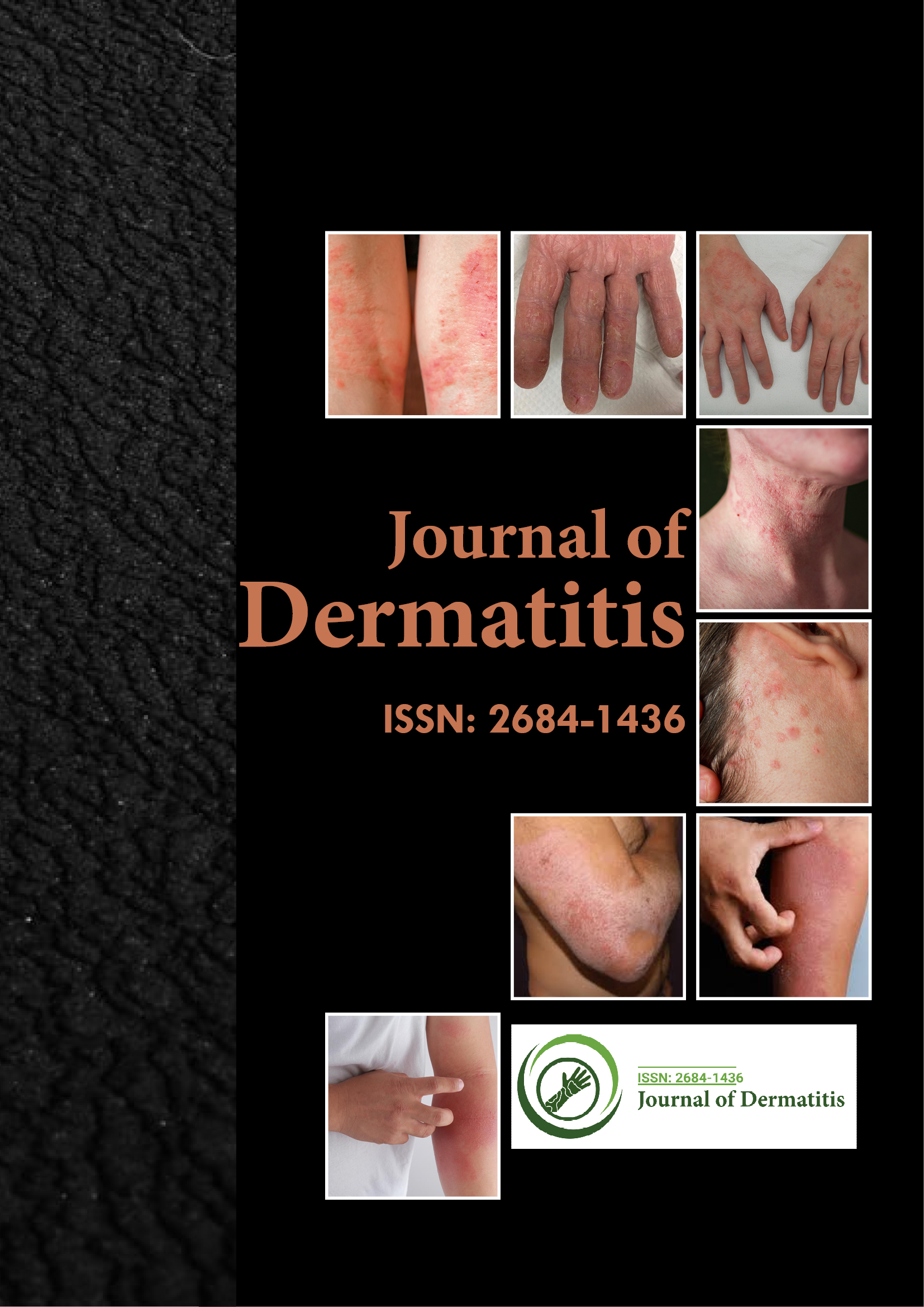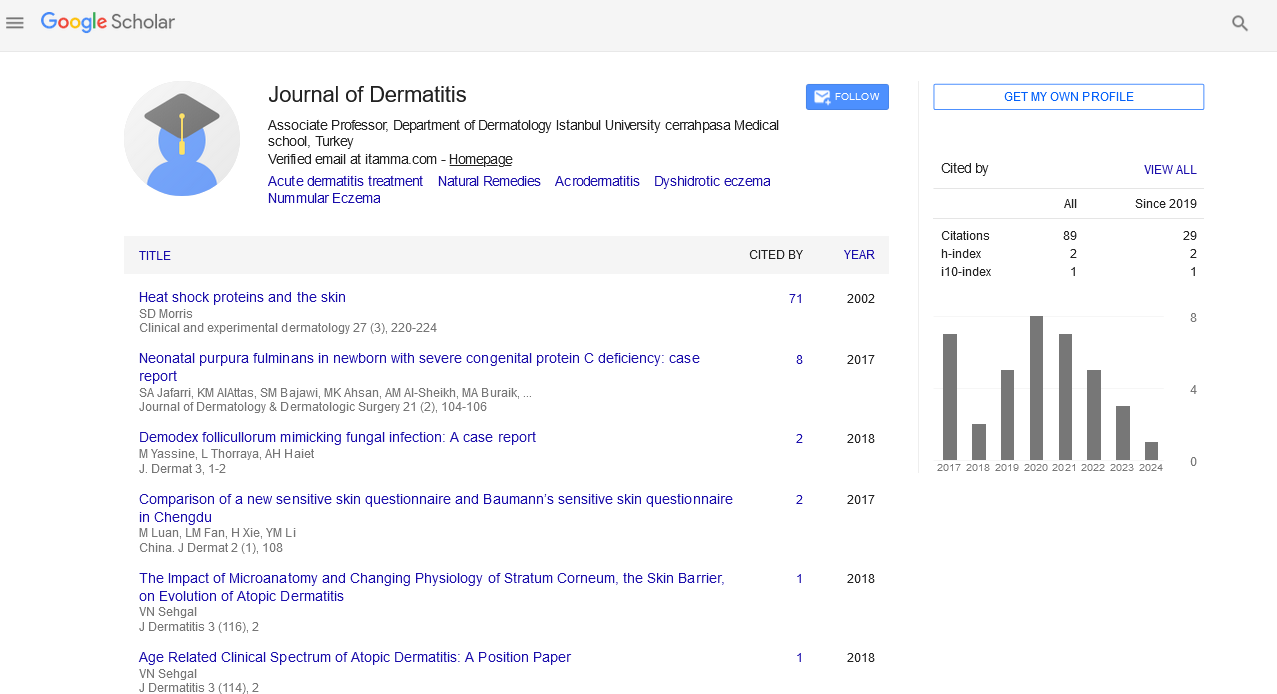Indexed In
- RefSeek
- Hamdard University
- EBSCO A-Z
- Euro Pub
- Google Scholar
Useful Links
Share This Page
Journal Flyer

Open Access Journals
- Agri and Aquaculture
- Biochemistry
- Bioinformatics & Systems Biology
- Business & Management
- Chemistry
- Clinical Sciences
- Engineering
- Food & Nutrition
- General Science
- Genetics & Molecular Biology
- Immunology & Microbiology
- Medical Sciences
- Neuroscience & Psychology
- Nursing & Health Care
- Pharmaceutical Sciences
Opinion Article - (2023) Volume 8, Issue 3
Effect of Environmental Factors and Ultraviolet Radiation on Causing Skin Cancer
Natasha Kim*Received: 29-Mar-2023, Manuscript No. JOD-23-21113; Editor assigned: 31-Mar-2023, Pre QC No. JOD-23-21113 (PQ); Reviewed: 21-Apr-2023, QC No. JOD-23-21113; Revised: 28-Apr-2023, Manuscript No. JOD-23-21113 (R); Published: 05-May-2023, DOI: 10.35248/2684-1436.23.8.198
Description
Skin cancer is a type of cancer that occurs when there is an uncontrolled growth of abnormal cells in the skin. It is the most common type of cancer worldwide, with over 3 million cases diagnosed every year. There are several factors that can cause skin cancer, including exposure to UV radiation, genetics, and environmental factors. In this article, we will explore the various mechanisms by which these factors can cause skin cancer.
The most significant risk factor for skin cancer is exposure to ultraviolet radiation. This is because UV radiation damages the Deoxyribonucleic acid (DNA) in skin cells, causing mutations that can lead to cancer. Three distinct types of Ultraviolet (UV) radiation of Ultraviolet A (UVA), Ultraviolet B (UVB), and Ultraviolet C (UVC) are identified. UVC radiation is absorbed by the earth's atmosphere, so it does not pose a significant risk. UVA radiation penetrates deep into the skin and causes premature aging and wrinkling, while UVB radiation is responsible for sunburns and plays a major role in the development of skin cancer.
UVB radiation damages the DNA in skin cells by causing the formation of pyrimidine dimers, which are lesions that distort the shape of the DNA molecule. This distortion can lead to errors in DNA replication, which can result in mutations. If these mutations occur in genes that regulate cell growth, they can cause the cells to divide uncontrollably, leading to the development of skin cancer.
Another factor that can cause skin cancer is genetics. Some people are born with genetic mutations that increase their risk of developing skin cancer. For instance, the most deadly type of skin cancer, melanoma has been associated with mutations in the Cyclin-Dependent Kinase Inhibitor 2A (CDKN2A) gene. These mutations prevent the gene from producing a protein that helps regulate cell division, which can lead to the uncontrolled growth of skin cells.
Skin cancer development may also be influenced by environmental factors. Skin cancer risk can be exacerbated by exposure to specific substances, including arsenic. Arsenic is a naturally occurring element that is found in soil and groundwater in some parts of the world. Long-term exposure to arsenic can damage the DNA in skin cells, leading to mutations that can cause cancer.
Another environmental factor that can increase the risk of skin cancer is exposure to ionizing radiation. This type of radiation is used in medical imaging, such as X-rays and Computed Tomography (CT) scans. While the doses used in medical imaging are generally considered safe, repeated exposure over time can increase the risk of developing skin cancer.
In conclusion, skin cancer is a complex disease that can be caused by a variety of factors. UV radiation is the most significant risk factor, as it can cause DNA damage that leads to mutations and the uncontrolled growth of skin cells. Genetics and environmental factors such as exposure to chemicals and ionizing radiation can also increase the risk of skin cancer. It is important to protect your skin from UV radiation by wearing protective clothing, using sunscreen, and avoiding prolonged exposure to the sun. If you notice any unusual changes in your skin, such as new moles or changes in the appearance of existing moles, it is important to see a dermatologist for evaluation. Skin cancer success rates can be significantly increased by early detection and treatment.
Citation: Kim N (2023) Effect of Environmental Factors and Ultraviolet Radiation on Causing Skin Cancer. J Dermatitis. 8:198.
Copyright: © 2023 Kim N. This is an open-access article distributed under the terms of the Creative Commons Attribution License, which permits unrestricted use, distribution, and reproduction in any medium, provided the original author and source are credited.

